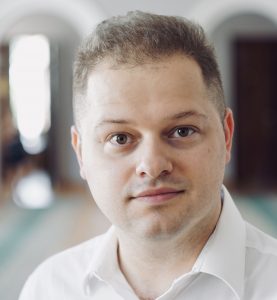Sacralization of AI

Yulia Razmetaeva is a visiting researcher at Uppsala University (Sweden) and Head of the Center for Law, Ethics and Digital Technologies at Yaroslav Mudryi National Law University (Ukraine). The post is a part the Sacralization of AI series.
We created AI. Now, AI is re-creating us. Smart algorithms have already changed much in our societies and lives. Artificial intelligence has changed our daily habits, decision-making processes, work environments, transportation management, natural disaster response and recovery, peacetime elections, and the defense of nations in wartime. There will be even more changes when we replace even more human effort with that of machines. There’s no way we can do without algorithms—they are indispensable, and we now rely on them for each and every step we take. As AI seems to have penetrated every tier of our lives, it is now part of the atmosphere, along with oxygen, and is essentially perceived as a deity or holy spirit that is omnipresent, omniscient, and omnipotent.


